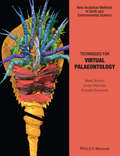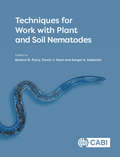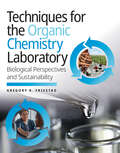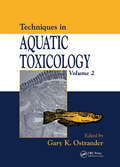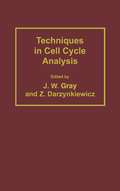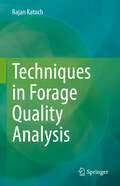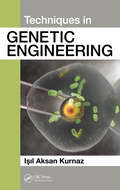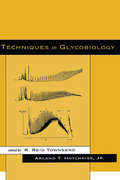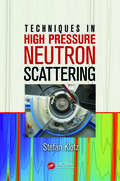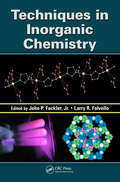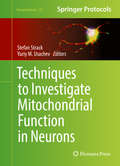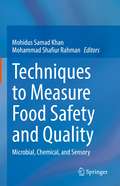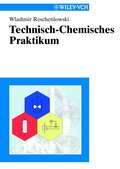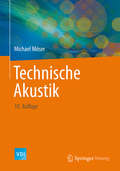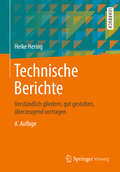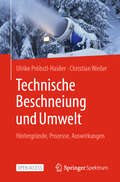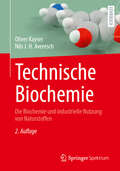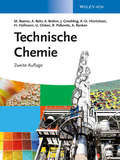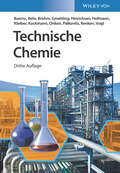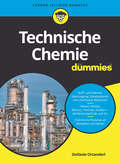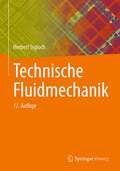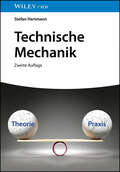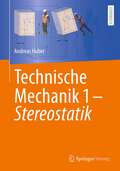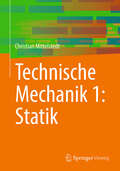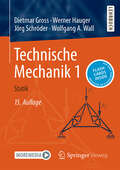- Table View
- List View
Techniques for Virtual Palaeontology (Analytical Methods in Earth and Environmental Science)
by Mark Sutton Russell Garwood Imran RahmanVirtual palaeontology, the use of interactive three-dimensional digital models as a supplement or alternative to physical specimens for scientific study and communication, is rapidly becoming important to advanced students and researchers. Using non-invasive techniques, the method allows the capture of large quantities of useful data without damaging the fossils being studied Techniques for Virtual Palaeontology guides palaeontologists through the decisions involved in designing a virtual palaeontology workflow and gives a comprehensive overview, providing discussions of underlying theory, applications, historical development, details of practical methodologies, and case studies. Techniques covered include physical-optical tomography (serial sectioning), focused ion beam tomography, all forms of X-ray CT, neutron tomography, magnetic resonance imaging, optical tomography, laser scanning, and photogrammetry. Visualization techniques and data/file formats are also discussed in detail. Readership: All palaeontologists and students interested in three-dimensional visualization and analysis. New Analytical Methods in Earth and Environmental Science Because of the plethora of analytical techniques now available, and the acceleration of technological advance, many earth scientists find it difficult to know where to turn for reliable information on the latest tools at their disposal, and may lack the expertise to assess the relative strengths or limitations of a particular technique. This new series will address these difficulties by providing accessible introductions to important new techniques, lab and field protocols, suggestions for data handling and interpretation, and useful case studies. The series represents an invaluable and trusted source of information for researchers, advanced students and applied earth scientists wishing to familiarise themselves with emerging techniques in their field. All titles in this series are available in a variety of full-colour, searchable eBook formats. Titles are also available in an enhanced eBook edition which may include additional features such as DOI linking, high resolution graphics and video.
Techniques for Work with Plant and Soil Nematodes
by Roland N. Perry Sergei A. Subbotin David J. HuntPlant-parasitic and free-living nematodes are increasingly important in relation to food security, quarantine measures, ecology (including pollution studies), and research on host-parasite interactions. Being mostly microscopic, nematodes are challenging organisms for research. Techniques for Work with Plant and Soil Nematodes introduces the basic techniques for laboratory and field work with plant-parasitic and free-living soil-dwelling nematodes. Written by an international team of experts, this book is extensively illustrated, and addresses both fundamental traditional techniques and new methodologies. The book covers areas that have become more widespread over recent years, such as techniques used in diagnostic laboratories, including computerized methods to count and identify nematodes. Information on physiological assays, electron microscopy techniques and basic information on current molecular methodologies and their various applications is also included. This book is an essential resource for students of nematology and parasitology, academic researchers, diagnostic laboratories, and quarantine and advisory service personnel. It provides a much-needed methodology standard for anyone involved in work on plant and soil nematodes.
Techniques for the Organic Chemistry Laboratory (First Edition): Biological Perspectives And Sustainability
by Gregory K. FriestadBring green chemistry into your organic lab. Gregory Friestad’s Techniques for the Organic Chemistry Laboratory: Biological Perspectives and Sustainability, developed and student tested at the University of Iowa, is the first modern text written from the ground up to integrate green chemistry principles throughout the entire lab curriculum. Norton offers flexible and affordable options, as well as unmatched instructor support tools and techniques videos. This purchase offers access to the digital ebook only.
Techniques in Aquatic Toxicology, Volume 2
by Gary K. OstranderFollowing up on his popular Techniques in Aquatic Toxicology with a second volume, now nine years later, Dr. Ostrander has once again called on the top aquatic toxicologists from across the world to present 39 chapters of unique collection and testing procedures. Updating five techniques from the first volume, the authors have gone on to add over two dozen new techniques. Every chapter covers a specific procedure that can easily be reproduced by any competent technician with basic knowledge. Each of the chapter authors provides and interprets typical and anomalous results, false positives, and artifacts. Data is provided either from recently published experiments or from work being published for the first time.
Techniques in Cell Cycle Analysis
by Zbigniew Darzynkiewicz Joe W. GrayTechniques in Cell Cycle Analysis
Techniques in Forage Quality Analysis
by Rajan KatochThe book covers different techniques and methodologies involved in the nutritional quality analysis of forages. It also discusses the nutritional quality, anti-nutritional components, factors affecting forage quality, feed processing and conservation. Different techniques and methodologies have been presented in a simplified manner. The book has been divided in separate chapters and each chapter discusses different aspect of forage quality. Further, the book also covers the topics on conservation and processing of forages and management techniques for improving the forage nutritional quality. This book is an essential source of information for research scholars, post-graduate students and scientists working on forage quality estimation and also in livestock and dairy industries.
Techniques in Genetic Engineering
by Isil Aksan KurnazAlthough designed for undergraduates with an interest in molecular biology, biotechnology, and bioengineering, this book-Techniques in Genetic Engineering-IS NOT: a laboratory manual; nor is it a textbook on molecular biology or biochemistry. There is some basic information in the appendices about core concepts such as DNA, RNA, protein, genes, and
Techniques in Glycobiology
by R. Reid Townsend Arland T.Hotchkiss J rThis work covers methodologies for plant and animal glycoconjugate analysis. It details mass spectrometry, nuclear magnetic resonance spectroscopy, glycolipids and new physical methods, o-glycosylation characterization, chromophore and fluorophore labelling of oligosaccharides, separations, exoglycosidases and mapping, and plant glycobiology.
Techniques in High Pressure Neutron Scattering
by Stefan KlotzDrawing on the author's practical work from the last 20 years, Techniques in High Pressure Neutron Scattering is one of the first books to gather recent methods that allow neutron scattering well beyond 10 GPa. The author shows how neutron scattering has to be adapted to the pressure range and type of measurement.Suitable for both newcomers and exp
Techniques in Inorganic Chemistry
by John P. Fackler Larry R. FalvelloInorganic chemistry continues to generate much current interest due to its array of applications, ranging from materials to biology and medicine. Techniques in Inorganic Chemistry assembles a collection of articles from international experts who describe modern methods used by research students and chemists for studying the properties and structure
Techniques to Investigate Mitochondrial Function in Neurons
by Stefan Strack Yuriy M. UsachevThis volume describes a broad spectrum of experimental approaches for investigating structure, function, and transport of neuronal mitochondria in health and disease. Most of these approaches were only recently developed and range from electron tomography-based 3D reconstruction of mitochondrial cristae to patch clamp recording from mitochondria in intact neurons. The chapters in this book cover topics such as mitochondrial proteomics, fluorescence lifetime imaging, respirometry and mitophagy, as well as optical approaches based on the use of genetically engineered fluorescent sensors for monitoring synaptic ATP and axonal ROS generation, mitochondrial Ca2+ cycling and pH changes, and mitochondrial dynamics and axonal trafficking in live neurons. Each chapter also discusses difficulties, tips, tricks, and precautions to take. Neuromethods series style chapters include the kind of detail and key advice from the specialists needed to get successful results in your laboratory. Cutting-edge and comprehensive, Techniques to Investigate Mitochondrial Function in Neurons is a valuable and useful resource for a broad range of investigators interested in the function of neuronal mitochondria in health and disease states.
Techniques to Measure Food Safety and Quality: Microbial, Chemical, and Sensory
by Mohammad Shafiur Rahman Mohidus Samad KhanThis book addresses the basic understanding of food contaminants and their sources, followed by the techniques to measure food safety and quality. It is divided into four parts: Part A - sources of contaminants in foods, their associated health risks, and integrated management and alternative options to minimize contaminants; Part B - Technological assessment of conventional methods and selected advanced methods for the detection, identification and enumeration of microbial contaminates; Part C - Technological assessment of different chemical measurements techniques; and Part D – Technological assessment of different instrumental techniques to assess sensory properties of foods.Food safety is a growing concern due to the increase in food-borne illnesses caused by food adulteration, excessive use of pesticides, use of chemical preservatives and artificial fruit ripening agents, microbial contaminations, and improper food handling. Chemical contaminants in food could be transferred from environmental or agrochemical sources, personal care products, and other by-products of water disinfects. In addition, microbial food safety can be threatened due to the presence of many pathogens, such as Salmonella, Escherichia coli, Clostridium botulinum, Staphylococcus aureus, and Listeria monocytogenes in foods. Globally, strict regulations are imposed to limit the potential contaminants in foods. Development of accurate, rapid, and inexpensive approaches to test food contamination and adulteration would be highly valued to ensure global food safety. There are existing processes to ensure safety of food products from chemical and microbial contaminants. Apart from the existing measurement technologies, varieties of new techniques are also being emerged and these could be potential to ensure food safety and quality. In addition to chemical and microbial properties, sensory properties such as texture, mouth feel, flavor, and taste, are among the most important attributes of food products to ensure their acceptability by consumers. Two approaches are available to evaluate sensory properties of food products, namely subjective and objective analyses. The responses are perceived by all five senses: smell, taste, sight, touch, and hearing. The approach used in sensory evaluation varies depending on the types of foods and the ultimate goal of the testing. Sensory attributes are the most important quality parameters after ensuring the safety of foods.
Technisch-Chemisches Praktikum
by Wladimir ReschetilowskiZu einer modernen Chemieausbildung geh rt ein Praktikum in technischer Chemie - und ein modernes, an den Erfordernissen der chemischen Industrie orientiertes Praktikumsbuch. In vielen praxisrelevanten und rechnergest tzten Versuchen zu den Themenbereichen Mess- und Regelungstechnik, Verfahrenstechnik und Reaktionstechnik eignet sich der Student fundiertes Wissen auf dem Gebiet der technischen Chemie an, das er sp ter im Berufsleben dringend braucht, wenn chemische Prozesse optimiert oder neu konzipiert werden m ssen. Ausgehend von Grundkenntnissen der Thermodynamik von Phasengleichgewichten und der chemischen Kinetik werden die physikalisch-chemischen Grundlagen fur die Auslegung von Prozesseinheiten zur mechanischen und thermischen Stofftrennung sowie fur prinzipielle M glichkeiten der Reaktionsf hrung mit der dazugeh rigen Mess- und Regelungstechnik vermittelt. Grundlage der in diesem Buch beschriebenen Praktikumsversuche ist das "Lehrprofil Technische Chemie" vom DECHEMA-Unterrichtsausschuss fur Technische Chemie.
Technische Akustik
by Michael MöserDas Standardwerk der Akustik ist auf die Ingenieursausbildung zugeschnitten. In allen Kapiteln steht die Frage im Mittelpunkt, wie die Lautstärke in den wichtigsten Umgebungen (in Gebäuden und im Freien) verringert werden kann. Begleitend wird das notwendige Grundlagenwissen über die Natur von Schall und Schwingungen vermittelt. Für die Neuauflage wurden schalltechnische Normen aktualisiert, die Themen Wellenausbreitung sowie Schallschutzwände erfahren besondere Aufmerksamkeit. Mit Zusammenfassungen, Übungsaufgaben und Lösungen zu jedem Kapitel.
Technische Berichte: Verständlich gliedern, gut gestalten, überzeugend vortragen (Viewegs Fachbücher Der Technik Ser.)
by Heike HeringTechnische Berichte enthält die Beschreibung aller wichtigen und notwendigen Kenntnisse und Fertigkeiten, um schriftliche oder mündliche Ausarbeitungen mit technischem Inhalt professionell zu gestalten. Das Buch bietet neben der Beantwortung der regelmäßig auftauchenden Fragen nach der formalen Gestaltung auch praktische Hinweise z. B. mit Mustergliederungen und Tipps beispielsweise in Form von Richtig-Falsch-Gegenüberstellungen. <P> Die neue Auflage enthält eine Auflistung mit Rhetorik-Tipps und wurde sprachlich und typographisch überarbeitet und für das Erstellen von englischsprachigen Berichten und den Umgang mit englischsprachiger Literatur erweitert. Auf Grund der anschaulichen und verständlichen Darstellung eignet sich das Buch sehr gut zum Selbststudium.
Technische Beschneiung und Umwelt: Hintergründe, Prozesse, Auswirkungen
by Ulrike Pröbstl-Haider Christian WeilerDie globale Erwärmung hat in den vergangenen Jahren die technische Beschneiung zu einer der wichtigsten Anpassungsmaßnahmen im Wintertourismus gemacht. Diese Open-Access-Publikation fasst das Wissen zu diesem Thema zusammen und beleuchtet die möglichen Konsequenzen für Boden, Vegetation, Tier- und Pflanzenwelt, Landschaftsbild sowie Lärmentwicklung. Darüber hinaus werden die Entstehungsgeschichte und die Auswirkungen des Klimawandels auf die Zukunft der Beschneiung beschrieben. So umstritten das Thema der technischen Beschneiung in der Bevölkerung ist, so vielfältig sind auch die Studien dazu. Die wissenschaftliche Auseinandersetzung mit diesem Thema und die Aufbereitung von über 40 wissenschaftlichen Studien aus den letzten Jahrzehnten vermitteln ein umfassendes Bild und tragen zur Versachlichung der Diskussion bei. Diese Ergebnisse werden durch praktische Erfahrungen sowie Möglichkeiten zur Vermeidung und Minderung von Beeinträchtigungen ergänzt. Das Fachbuch erklärt in diesem Zusammenhang auch, wie sich die teils widersprüchlichen Ergebnisse erklären lassen und welche Anforderungen sich daraus für die Genehmigung und den Betrieb der Anlagen ableiten. Für Leserinnen und Leser, die sich nur einen kurzen Überblick zu bestimmten Themen verschaffen möchten, werden farblich hervorgehobene Zusammenfassungen sowie zahlreiche Bilder und Illustrationen angeboten, die das Verständnis der komplexen Sachverhalte erleichtern. Diese differenzierte Aufbereitung des Themas richtet sich an alle, die an der Natur, am Wintersport und an einer umweltschonenden touristischen Entwicklung interessiert sind.
Technische Biochemie: Die Biochemie und industrielle Nutzung von Naturstoffen
by Oliver Kayser Nils J. AvereschDieses Lehrbuch der Biochemie wurde für die 2. Auflage vollständig überarbeitet und erweitert. Biotechnologen und Bioverfahrenstechniker finden präzise Informationen zu modernen Fragestellungen in dem faszinierenden und komplexen Gebiet der Technischen Biochemie, denn Technik und Biologie muss kein Widerspruch sein. Die Autoren haben den Versuch gewagt, ein Lehrbuch für Studierende der Bioingenieurwissenschaften auch aus dem Blickwinkel der Studierenden zu sehen und zu schreiben. Im Gegensatz zu bekannten und sehr gut etablierten Lehrbüchern der Biologie, Biochemie und Biotechnologie werden hier biologische Konzepte vorgestellt und mit technischen wie ingenieurwissenschaftlichen Problemen verknüpft. Das Anliegen dieses Lehrbuches ist, biochemische Prinzipien in der Naturstoffbiosynthese zu beleuchten und ihre biotechnischen und bioverfahrenstechnischen Herstellungswege zu erklären. Inhalt Anwendung der Biochemie in der Medizin, Pharmazie und Technik Photosynthese − die Chemie des Lichts Stoffwechsel der Kohlenhydrate − Zucker als Energieträger Aminosäuren und Peptide − Proteine als Biokatalysatoren Kohlenhydrate, Lipide und Proteine − Grundbausteine für technische und pharmazeutische Stoffe Wichtige Biosynthesen des Primär- und Sekundärstoffwechsels Naturstoffbiosynthese − Biologie und Chemie sekundärer Metabolite Zielgruppen Studierende der Bioverfahrenstechnik, Biotechnologie, Pharmazie, Chemie Biologen, Biotechniker, Verfahrenstechniker, Pharmazeuten, Chemiker mit Schwerpunkt Biotechnologie
Technische Chemie
by Albert Renken Arno Behr Jürgen Gmehling Manfred Baerns Axel Brehm Kai-Olaf Hinrichsen Hanns Hofmann Ulfert Onken Regina PalkovitsDas grundlegende Lehrbuch der Technischen Chemie mit hohem Praxisbezug jetzt in der zweiten Auflage: ?? beschreibt didaktisch äußerst gelungen die Bereiche – chemische Reaktionstechnik, Grundoperationen, Verfahrensentwicklung sowie chemische Prozesse ?? alle Kapitel wurden komplett überarbeitet und aktualisiert ?? NEU: umfangreiches Kapitel über Katalyse als Schlüsseltechnologie in der chemischen Industrie. Homogene und Heterogene Katalyse, aber auch Biokatalyse werden ausführlich behandelt ?? zahlreiche Fragen als Zusatzmaterial für Studenten online auf Wiley-Vch erhältlich ?? unterstützt das Lernen durch zahlreiche im Text eingestreute Rechenbeispiele, inklusive Lösung ?? setzt neben einem grundlegenden chemischen Verständnis und Grundkenntnissen der Physikalischen Chemie und Mathematik kein Spezialwissen voraus Ideal für Studierende der Chemie, des Chemieingenieurwesens und der Verfahrenstechnik in Bachelor- und Masterstudiengängen. Begleitmaterial für Dozenten verfügbar unter www.wiley-vch.de/textbooks Aus Rezensionen zur Vorauflage: „Endlich gibt es ein neues Lehrbuch auf Deutsch, das den Kernbereich der technischen Chemie umfassend abdeckt. Das Buch vereinigt auf einzigartige Weise das grundlegende Wissen aus den tragenden Säulen der technischen Chemie ... Technische Chemie deckt somit den Inhalt mehrerer älterer Lehrbücher ab...Hervorragend sind Sicherheitsaspekte in die Kapitel des Buches eingeflochten... Bei der Erarbeitung des Stoffs sind die zahlreichen Rechenbeispiele äußerst hilfreich, deren Musterlösungen leicht nachzuvollziehen sind... Insgesamt ist das Buch äußerst ansprechend und gelungen und hat das Potential, das grundlegende Standardwerk für das Studium in technischer Chemie sowie ein wichtiges Nachschlagewerk für die berufliche Praxis zu werden.“ Nachrichten aus der Chemie „...Neben der Darstellung der Grundlagen bestand ein Ziel der Autoren auch darin, Verknüpfungen zwischen den verschiedenen Sachgebieten aufzuzeigen. Dies ist bestens gelungen. Das gesamte Gebiet der technischen Chemie und der Verfahrenstechnik wird grundlegend, jedoch in komprimierter Form dargeboten.“ Filtrieren und Separieren
Technische Chemie
by Norbert Kockmann Albert Renken Arno Behr Jürgen Gmehling Michael Kleiber Manfred Baerns Axel Brehm Kai-Olaf Hinrichsen Hanns Hofmann Ulfert Onken Regina Palkovits Dieter VogtDas grundlegende Lehrbuch der Technischen Chemie mit hohem Praxisbezug in der dritten Auflage: * beschreibt didaktisch äußerst gelungen die Bereiche - chemische Reaktionstechnik, Grundoperationen, Verfahrensentwicklung sowie chemische Prozesse * alle Kapitel wurden komplett überarbeitet und aktualisiert * zahlreiche Fragen als Zusatzmaterial für Studenten online auf Wiley-VCH erhältlich * unterstützt das Lernen durch zahlreiche im Text eingestreute Rechenbeispiele, inklusive Lösung * setzt neben einem grundlegenden chemischen Verständnis und Grundkenntnissen der Physikalischen Chemie und Mathematik kein Spezialwissen voraus *NEU: Neue Technologien und Rohstoffe relevant für moderne industrielle Prozesse Ideal für Studierende der Chemie, des Chemieingenieurwesens und der Verfahrenstechnik in Bachelor- und Masterstudiengängen.
Technische Chemie für Dummies (Für Dummies)
by Stefanie OrtanderlOb im Studium oder in der Praxis - bei der technischen Chemie kommt man schnell an seine Grenzen. Aber keine Sorge, "Technische Chemie für Dummies" hilft Ihnen, bei diesem komplexen Thema den Durchblick zu behalten. Nach einem allgemeinen Überblick über die Entwicklungen, Herausforderungen und Konzepte der technischen Chemie und einer verständlichen Übersicht über die nötige Mathematik lernen Sie, was man bei der praktischen und theoretischen Vorarbeit beachten muss, um die chemische Reaktion später in einem größeren Maßstab durchführen zu können. Anschließend erfahren Sie alles über Reaktionsmodellierung, Katalysatoren und chemische Reaktoren. Idealisierte Modelle helfen Ihnen dabei, aber auch die Umsetzung unter realen Bedingungen kommt nicht zu kurz. Der Verfahrenstechnik ist ein eigener Teil gewidmet, damit auch Trenntechnik, Strömungsmechanik, Fluidströmungen, Dimensionierung und Co. bald kein Problem mehr für Sie sind.
Technische Fluidmechanik
by Herbert SiglochDieses erfolgreiche Lehrbuch vermittelt die Grundlagen der Fluidmechanik und deren praxisbezogene Anwendung, geht jedoch über eine Einführung hinaus. Die strömungstechnischen Phänomene werden beschrieben und mathematisch exakt oder - falls dies nicht möglich - näherungsweise dargestellt. Sie werden durch Messwerte unterstützt und weitgehend physikalisch begründet. Zum besseren Verständnis sind die Erscheinungen der Fluidmechanik ausgehend von der Festkörpermechanik veranschaulicht. Dabei werden Analogien zu anderen Fachgebieten aufgezeigt. Dargestellt sind die Statik und Dynamik sowohl der Flüssigkeiten als auch der Gase und Dämpfe. Bei der Gasdynamik sind Unterschall- und Überschallströmungen einbezogen. Eine Einführung in die moderne numerische Strömungsmechanik - die Computational Fluid Dynamics (CFD) - ergänzt den Stoff. Hinzu kommen 100 Übungsbeispiele mit kompletten Lösungen. Der Anhang enthält technisch wichtige Tabellen sowie Diagramme für Stoffgrößen und Beiwerte der Strömungstechnik.In der 11. Auflage wurden Inhalte überarbeitet und das Werk wurde in ein neues Layout überführt.
Technische Mechanik
by Stefan HartmannDie Technische Mechanik (TM) ist ein unerlässliches Grundlagenfach und bietet das Rüstzeug für die Planung und Entwicklung komplexer Strukturen wie zum Beispiel Gebäude, Brücken, Fahrzeuge oder Triebwerke. Die TM liefert das theoretische Hintergrundwissen und die Verfahren zur Untersuchung von Kräften und Bewegungen und somit zur Berechnung der Konstruktion, Festigkeit, Lebensdauer und Zuverlässigkeit von Bauteilen. Sie liefert damit die Antwort auf die Frage: Was ist technisch möglich? Teilgebiete, die den Inhalt der klassischen Technischen Mechanik darstellen sind Statik, Festigkeitslehre, Kinematik und Dynamik. Stefan Hartmanns „Technische Mechanik“ ist konzipiert als vorlesungsbegleitendes Buch für Ingenieurstudiengänge wie zum Beispiel Bauwesen, Maschinenbau und Verfahrenstechnik an deutschsprachigen Universitäten. Der Autor vermittelt die Grundlagen und prüfungsrelevanten Inhalte dieses zentralen, aber oft gefürchteten Faches auf hohem didaktischen Niveau. Er beschreibt dabei klar strukturiert und schlüssig die großen Themengebiete der klassischen Technischen Mechanik – Statik, Elastostatik, und Dynamik – in einem Band. Es hilft dabei, die in der Vorlesung oder im Seminar behandelten Themen im Selbststudium nachzuarbeiten, kann aber auch zum schnellen Nachschlagen genutzt werden. Mathematische Zusammenhänge werden präzise hergeleitet und systematisch zum Lösen von komplexen Aufgabenstellungen herangezogen. Die dafür notwendige mathematische Sprache (Vektorrechnung, lineare Algebra) wird den Studierenden zusätzlich vermittelt. Zahlreiche Abbildungen und kurze, realitätsnahe Übungsaufgaben erleichtern das Verständnis des Lehrstoffs. Eine treffende Zusammenfassung am Ende eines Kapitels gibt zudem Überblick und fokussiert den Blick auf die wichtigsten Konzepte. Die Studierenden erhalten damit das nötige Rüstzeug zur Bewältigung des komplexen Stoffes. Neu in dieser vollständig überarbeiteten zweiten Auflage sind vertiefte Darstellungen des wichtigen Konzepts der statischen Bestimmtheit, von Schwingungen ohne und mit Dämpfung sowie der Stabilität und Linearisierung von Bewegungen.
Technische Mechanik 1 - Stereostatik
by Andreas HuberDer erste Band dieser Buchreihe beschäftigt sich mit der Stereostatik. Beginnend mit den Grundlagen und Axiomen von Newton wird Schritt für Schritt die Statik erarbeitet.Besonders großer Wert wird in diesem Buch und das unterscheidet dieses auch klar von allen anderen Literaturen zur Technischen Mechanik, auf die Lösung von Beispielen durch computergestützte Methoden gelegt, wie: Matlab oder SolidWorks FEM. Damit wird auch immer wieder ein Einblick, in die Lösung von Beispielen am späteren Arbeitsplatz durch industrielle Anwendungen ermöglicht.Bereits Henry Ford sagte: „Es gibt mehr Leute, die kapitulieren, als solche, die scheitern.“ Beim Prozess, die kapitulierenden Menschen in motivierte Studenten zu überführen, soll dieses Buch als Hilfestellung dienen und um zu zeigen, dass Mechanik mehr ist, als nur die Summe aller Kräfte, die einander das Gleichgewicht halten.
Technische Mechanik 1: Statik
by Christian MittelstedtDieses Buch folgt der klassischen Gliederung der Technischen Mechanik, wie sie an Fachhochschulen und Universitäten in Deutschland gelehrt wird, und widmet sich der Statik, d.h. der Betrachtung von Körpern in Ruhe unter Kräften. Ziel des Buches ist es, den Studierenden eine anschauliche Einführung in die Statik zu geben und sie in die Lage zu versetzen, ingenieurtechnische Probleme selbständig zu formulieren und zu lösen. Zu diesem Zweck bietet das Buch eine Reihe von Beispielen. Das Buch wendet sich an Studierende an Fachhochschulen und Universitäten des Maschinenbaus, des Bauingenieurwesens, der Mechanik und aller anderen Studiengänge, in denen die Statik eine Rolle spielt.
Technische Mechanik 1: Statik
by Dietmar Gross Jörg Schröder Werner Hauger Wolfgang A. WallDer Band Statik ist der erste Teil der vierbändigen Lehrbuchreihe. Der Bestseller zur Technischen Mechanik erscheint nun in der 15. Auflage. Ziel des didaktisch ausgefeilten Werkes ist es, das Verständnis der wesentlichen Grundgesetze der Mechanik zu vermitteln und die Fähigkeit zu entwickeln, mit Hilfe der Mechanik Ingenieurprobleme zu formulieren und selbständig zu lösen. Es wurde ein möglichst einfacher Zugang zur Mechanik gewählt. Der dargestellte Stoff orientiert sich am Umfang der Mechanikkurse an deutschsprachigen Hochschulen und ist für alle Bachelor- und Diplomstudiengänge hervorragend geeignet. Das Buch enthält zahlreiche vollständig durchgerechnete Beispiele, mit deren Hilfe der Leser die Anwendung der Grundgesetze trainieren kann. Band 2 behandelt die Elastostatik, Band 3 die Kinetik und Band 4 die Hydromechanik sowie Elemente der Höheren Mechanik. Ergänzt werden die Lehrbücher durch sorgfältig abgestimmte Aufgabenbände. Auf Grund des großen Erfolges ist die Lehrbuchreihe auch in englischer Sprache als dreibändiges Werk unter dem Titel "Engineering Mechanics" erschienen. Zusätzliche Fragen per App: Laden Sie die Springer-Nature-Flashcards-App kostenlos herunter und nutzen Sie exklusives Zusatzmaterial, um Ihr Wissen zu prüfen. Die Zielgruppen Das Buch wendet sich an Studierende der Ingenieurwissenschaften aller Fachrichtungen an Universitäten und Hochschulen für angewandte Wissenschaften.
